- Students and alumni support vaccination campaigns in long-term care homes
- Her own experience as a student inspired three decades of giving back
- Winners of the Cecilia and Late George Piller Graduate Research Award named
- The top 10 ways to engage in the upcoming Staff Conference
- Global Engagement Seminar: Telling the story of the Grand River
Editor:
Brandon Sweet
University Communications
bulletin@uwaterloo.ca
Students and alumni support vaccination campaigns in long-term care homes
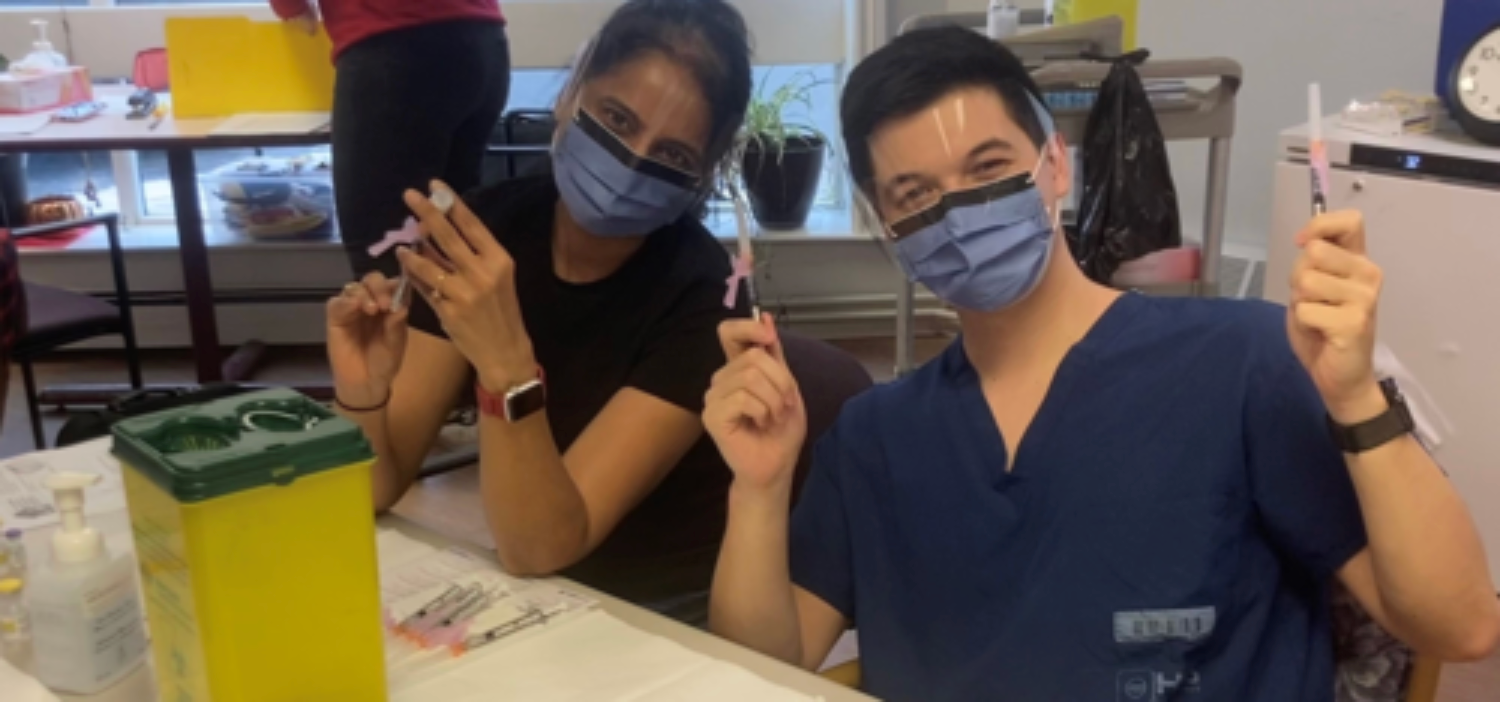
March is Pharmacy Appreciation Month. This month, in our #PAM2022 series, the School of Pharmacy is looking back on the many ways that our pharmacy community has supported Canadians through the pandemic.
Long-term care homes are among the hardest hit institutions in terms of COVID-19 infections in Canada. When vaccines began to arrive in Canada, long-term care (LTC) homes were consequently identified as a high priority for vaccination.
In Ottawa, the public health unit asked local hospitals to help with vaccine distribution to high-risk areas like LTC homes and retirement communities.
“I’ve worked at the Children’s Hospital of Eastern Ontario (CHEO) since I finished my placement here,” says Alex Wong, recent Waterloo Pharmacy graduate. “I knew that anything I could do to help the vaccination effort would bring us closer to ending this pandemic, so I didn’t hesitate to participate.”
Wong, along with other pharmacists, technicians and pharmacy students from CHEO, joined public health nurses on mobile vaccination clinics in the homes.
“We were always very conscious of needing to minimize any vaccine waste,” says Alex. “We were also assigned to homes on an as-needed basis and would often only find out about our assignment the day prior. The weeks were challenging to schedule.”
Over three months, the CHEO teams made dozens of visits. They collaborated with the public health nurses and physicians to ensure a smooth experience for residents.
“We felt immense gratitude from the LTC staff, and I felt very appreciated supporting the team in this way,” says Alicia Davis, a pharmacy co-op student who supported the clinics. “I have returned to a few LTC homes that I had worked at previously while they were under outbreak safety measures, and it was marvelous to see residents back in communal spaces and in better spirits now that they had received their vaccinations.”
Read the full story on the School of Pharmacy website.
Her own experience as a student inspired three decades of giving back
A message from the Office of Advancement.
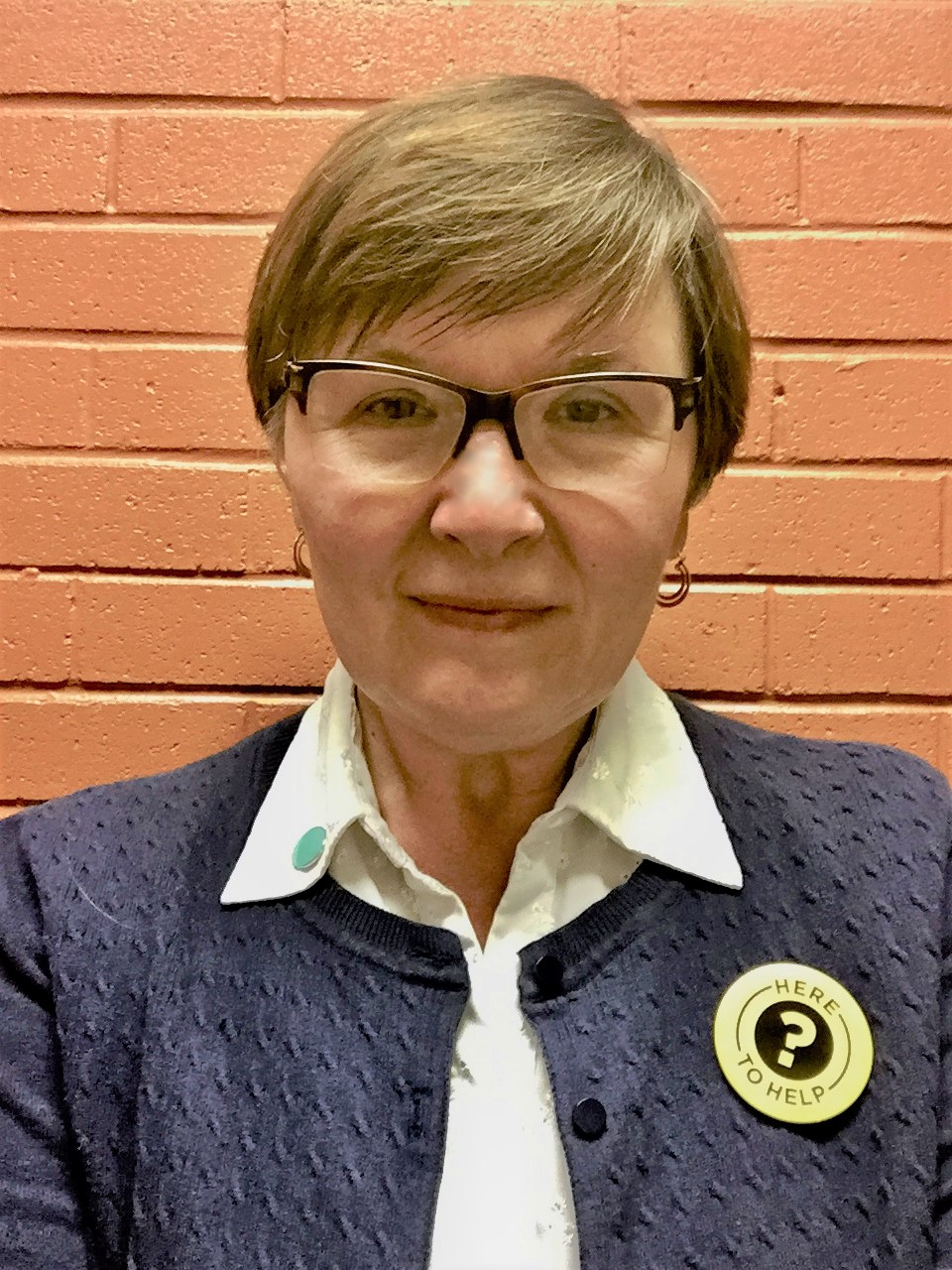
Even though she’s now retired, long-time staff member Rose Vogt (BES ’84) continues to support Waterloo students through her time and charitable gifts. A loyal donor for more than thirty years, Rose has generously supported the Faculty of Environment, the Student Emergency Support Fund, the Catherine and Feridun Hamdullahpur Graduate Scholarship and Waterloo’s Giving Tuesday campaign.
And, as a co-chair with the Faculty, Staff and Retiree Giving Program, she aims to promote a culture of philanthropy among her fellow retirees.
Winners of the Cecilia and Late George Piller Graduate Research Award named
A message from the Department of Germanic and Slavic Studies.
The Department of Germanic and Slavic Studies has announced the 2022 winners of the Cecilia and Late George Piller Graduate Research Awards:
- Richard Barnett, PhD Candidate with the Department of Germanic and Slavic Studies
- Annemarie Hezel, Intercultural German Studies MA Candidate with the Department of Germanic and Slavic Studies
The Cecilia and Late George Piller Graduate Research Awards were established to support excellent graduate students in the Faculty of Arts doing research into any aspect of German Studies.
The winners, chosen from a set of very strong applications, demonstrate the high calibre of the research into German studies being conducted by graduate students in the Faculty of Arts at the University of Waterloo.
Each winner will receive a $4,000 prize to help fund their research.
For inquiries, please contact the Waterloo Centre for German Studies (wcgs@uwaterloo.ca). For further information, please visit the Cecilia and Late George Piller Graduate Research Award website.
The top 10 ways to engage in the upcoming Staff Conference
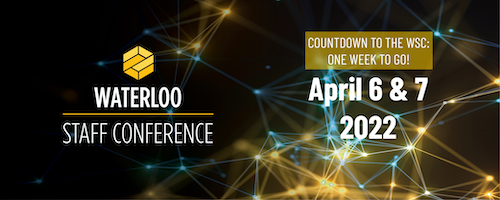
A message from Organizational and Human Development (OHD).
Organizational & Human Development have been asking around to find out how staff will be engaging with the virtual Staff Conference this year, and we wanted to share our favourite tips with you.
#10: Find out who else is attending
Post the conference agenda and have teammates indicate which sessions they have signed up for so people can see who they are "attending with".
#9: Watch together
Book a meeting room to livestream the keynotes, lunchtime drop-ins or other popular sessions or create virtual “watch parties” on Teams.
#8: Encourage others to participate to (re)build community
You are an official ambassador of the WSC – spread the word. Encouraging community with a focus on professional development can be a positive way to reconnect, recalibrate and rejuvenate our teams.
#7: Trade off
For teams with frontline positions, try trading off for service coverage so everyone can attend at least one live session of their choice.
#6: Make technology available
For staff who do not work on computers in their roles, have laptops or TVs for streaming the conference sessions available to sign out.
#5: Connect the dots
After attending an event – talk about it! Consider adding a "learning” channel to your Teams where you can post content and discuss:
- What did we learn from attending this keynote/workshop?
- How does it apply to the services we offer?
- What was one point that really stood out to you about the talk?
- How did the talk challenge you to think differently about?
- How could we as a team build the key takeaways into our day-to-day work?
#4: Lean into your curiosity
Actively participating in the conference keynotes and workshops by asking questions and participating in the interactive elements means more fun and benefit for you.
#3: Make time for it – truly
The biggest obstacle to meaningful engagement (and learning) is not being fully present. If you’ve signed up for a session, gift yourself by truly setting aside and investing the time.
#2: Pro Tip for Managers: Lead by Example
- Share with your team how you plan to engage with the conference
- Discuss past experiences; knowledge gained, and memories created
- Communicate how you will be creating time and space for your teams to attend
#1: Have fun with this experience
At this time of continued transition and change, the Waterloo Staff Conference is a spring tradition that is steeped in good feelings of community building and learning together.
Global Engagement Seminar: Telling the story of the Grand River
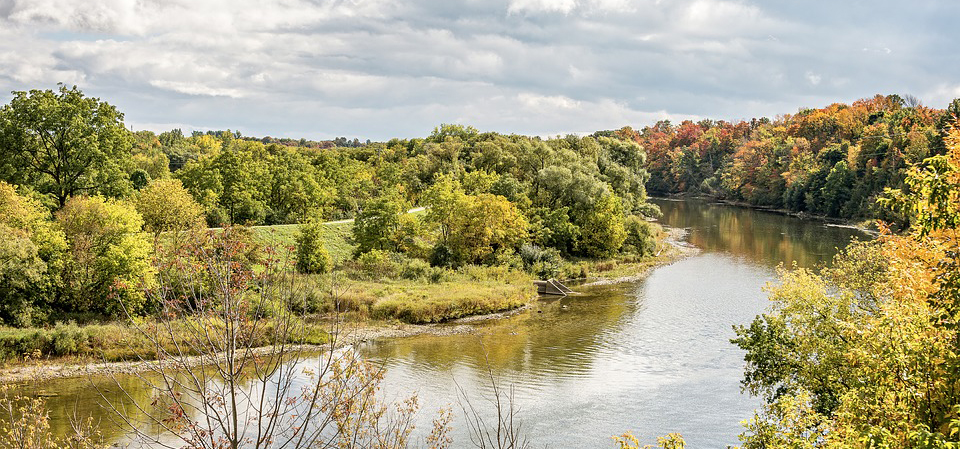
By Hannah Anderson, Course and Research Assistant, Global Engagement Seminar.
During the Winter 2022 Global Engagement Seminar (GES) themed “Water in the World: Environment, Knowledge, Ethics, and Practice,” I have worked as the Course and Research Assistant and mentored the undergraduates who present five Waterloo faculties. As we prepare for the GES Summit on April 4 to showcase the term’s work, I would like to share a little about my experience with the seminar.
Specifically, I would like to focus on a project that is helping to tell the story of the Grand River through maps. This experience has been one of collective creativity fostered by caring and open people.
I have been taught that we all come from water. Water is nourishing and water is life. Participation in any focused study of water is necessarily community-focused, self-referential, and reflective because it is a study of ourselves. To partake in a seminar or project that focuses on water and how we come to know and interact with water requires humility. For these reasons, forming collaborations around water is special.
One student project in the GES this term started with a conversation with Dr. Dawn Martin-Hill at McMaster University. Dr. Martin-Hill is one of the invited Jarislowsky Fellows in the course, and in our earliest conversations, she challenged us to think about what we, as people with immense resources, could contribute to existing local and regional projects around water. What emerged from this conversation was a beautiful and challenging collaboration with the Ohneganos project and Six Nations Polytechnic STEAM Academy. With this invitation and the welcoming and inspirational leadership of staff from the STEAM Academy, four UWaterloo students have been working with arts and learning strategies students from STEAM Academy to develop maps that share parts of the Grand River’s cultural and ecological story.
This specific student project is one part of a much larger story-telling and Indigenous mapping endeavour – Ohneganos. It is exciting to see how the project has grown over the past three months, and will continue to grow as part of a larger collaborative mapping effort.
Collaboration is a challenging subject to talk about because, in some contexts, it has become a buzzword and lost its meaning. The concept is simple and important: collaboration is about working together to create something. Every new collaboration is unique because the practice of creating is shaped by the particular goals and perspectives of the people involved; collaborations only exist through unity. This particular collaboration is dynamic. This project is youth-oriented and learning-focused. Everyone approached the project with openness and enthusiasm, which allowed for reciprocity and adaptation as we plotted a course forward.
The project is founded on the interests and goals of the students involved. The collective goal for this project has been on learning – learning about the Grand River, practicing new skills, and working with new people in creative ways. The STEAM students and UWaterloo students in this project have demonstrated their remarkable skills in a space that was centered on openness to sharing and responding to the needs of one another. The maps that are being created are alive because of the students’ listening, reading, writing, drawing, and photography. It is our sincere hope that the relationships and partnerships that started with this course will continue and grow.
I am humbled to have been asked to share my experience with the Water in the World seminar, and I thank you for following my words. If you take anything from this piece, I hope it is this: the strongest collaborations are made by caring people; the work of students and educators who care about knowledge, a river, and the complexity of water is proof of this. Nia:wen.
Please join us on April 4 for the Global Engagement 2022 Desmarais Family Summit: Water in the World.
Students and alumni support vaccination campaigns in long-term care homes
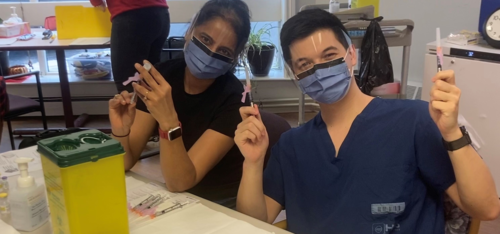
March is Pharmacy Appreciation Month. This month, in our #PAM2022 series, the School of Pharmacy is looking back on the many ways that our pharmacy community has supported Canadians through the pandemic.
Long-term care homes are among the hardest hit institutions in terms of COVID-19 infections in Canada. When vaccines began to arrive in Canada, long-term care (LTC) homes were consequently identified as a high priority for vaccination.
In Ottawa, the public health unit asked local hospitals to help with vaccine distribution to high-risk areas like LTC homes and retirement communities.
“I’ve worked at the Children’s Hospital of Eastern Ontario (CHEO) since I finished my placement here,” says Alex Wong, recent Waterloo Pharmacy graduate. “I knew that anything I could do to help the vaccination effort would bring us closer to ending this pandemic, so I didn’t hesitate to participate.”
Wong, along with other pharmacists, technicians and pharmacy students from CHEO, joined public health nurses on mobile vaccination clinics in the homes.
“We were always very conscious of needing to minimize any vaccine waste,” says Alex. “We were also assigned to homes on an as-needed basis and would often only find out about our assignment the day prior. The weeks were challenging to schedule.”
Over three months, the CHEO teams made dozens of visits. They collaborated with the public health nurses and physicians to ensure a smooth experience for residents.
“We felt immense gratitude from the LTC staff, and I felt very appreciated supporting the team in this way,” says Alicia Davis, a pharmacy co-op student who supported the clinics. “I have returned to a few LTC homes that I had worked at previously while they were under outbreak safety measures, and it was marvelous to see residents back in communal spaces and in better spirits now that they had received their vaccinations.”
Read the full story on the School of Pharmacy website.
Her own experience as a student inspired three decades of giving back
A message from the Office of Advancement.
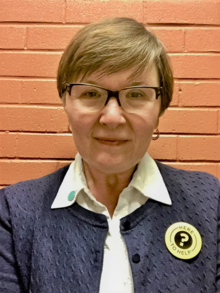 Even though she’s now retired, long-time staff member Rose Vogt (BES ’84) continues to support Waterloo students through her time and charitable gifts. A loyal donor for more than thirty years, Rose has generously supported the Faculty of Environment, the Student Emergency Support Fund, the Catherine and Feridun Hamdullahpur Graduate Scholarship and Waterloo’s Giving Tuesday campaign.
Even though she’s now retired, long-time staff member Rose Vogt (BES ’84) continues to support Waterloo students through her time and charitable gifts. A loyal donor for more than thirty years, Rose has generously supported the Faculty of Environment, the Student Emergency Support Fund, the Catherine and Feridun Hamdullahpur Graduate Scholarship and Waterloo’s Giving Tuesday campaign.
And, as a co-chair with the Faculty, Staff and Retiree Giving Program, she aims to promote a culture of philanthropy among her fellow retirees.
Winners of the Cecilia and Late George Piller Graduate Research Award named
A message from the Department of Germanic and Slavic Studies.
The Department of Germanic and Slavic Studies has announced the 2022 winners of the Cecilia and Late George Piller Graduate Research Awards:
- Richard Barnett, PhD Candidate with the Department of Germanic and Slavic Studies
- Annemarie Hezel, Intercultural German Studies MA Candidate with the Department of Germanic and Slavic Studies
The Cecilia and Late George Piller Graduate Research Awards were established to support excellent graduate students in the Faculty of Arts doing research into any aspect of German Studies.
The winners, chosen from a set of very strong applications, demonstrate the high calibre of the research into German studies being conducted by graduate students in the Faculty of Arts at the University of Waterloo.
Each winner will receive a $4,000 prize to help fund their research.
For inquiries, please contact the Waterloo Centre for German Studies (wcgs@uwaterloo.ca). For further information, please visit the Cecilia and Late George Piller Graduate Research Award website.
The top 10 ways to engage in the upcoming Staff Conference
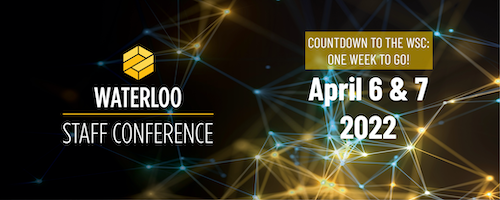
A message from Organizational and Human Development (OHD).
Organizational & Human Development have been asking around to find out how staff will be engaging with the virtual Staff Conference this year, and we wanted to share our favourite tips with you.
#10: Find out who else is attending
Post the conference agenda and have teammates indicate which sessions they have signed up for so people can see who they are "attending with".
#9: Watch together
Book a meeting room to livestream the keynotes, lunchtime drop-ins or other popular sessions or create virtual “watch parties” on Teams.
#8: Encourage others to participate to (re)build community
You are an official ambassador of the WSC – spread the word. Encouraging community with a focus on professional development can be a positive way to reconnect, recalibrate and rejuvenate our teams.
#7: Trade off
For teams with frontline positions, try trading off for service coverage so everyone can attend at least one live session of their choice.
#6: Make technology available
For staff who do not work on computers in their roles, have laptops or TVs for streaming the conference sessions available to sign out.
#5: Connect the dots
After attending an event – talk about it! Consider adding a "learning” channel to your Teams where you can post content and discuss:
- What did we learn from attending this keynote/workshop?
- How does it apply to the services we offer?
- What was one point that really stood out to you about the talk?
- How did the talk challenge you to think differently about?
- How could we as a team build the key takeaways into our day-to-day work?
#4: Lean into your curiosity
Actively participating in the conference keynotes and workshops by asking questions and participating in the interactive elements means more fun and benefit for you.
#3: Make time for it – truly
The biggest obstacle to meaningful engagement (and learning) is not being fully present. If you’ve signed up for a session, gift yourself by truly setting aside and investing the time.
#2: Pro Tip for Managers: Lead by Example
- Share with your team how you plan to engage with the conference
- Discuss past experiences; knowledge gained, and memories created
- Communicate how you will be creating time and space for your teams to attend
#1: Have fun with this experience
At this time of continued transition and change, the Waterloo Staff Conference is a spring tradition that is steeped in good feelings of community building and learning together.
Global Engagement Seminar: Telling the story of the Grand River
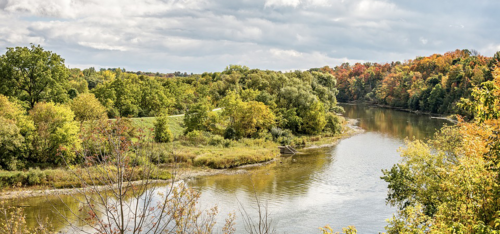
By Hannah Anderson, Course and Research Assistant, Global Engagement Seminar.
During the Winter 2022 Global Engagement Seminar (GES) themed “Water in the World: Environment, Knowledge, Ethics, and Practice,” I have worked as the Course and Research Assistant and mentored the undergraduates who present five Waterloo faculties. As we prepare for the GES Summit on April 4 to showcase the term’s work, I would like to share a little about my experience with the seminar.
Specifically, I would like to focus on a project that is helping to tell the story of the Grand River through maps. This experience has been one of collective creativity fostered by caring and open people.
I have been taught that we all come from water. Water is nourishing and water is life. Participation in any focused study of water is necessarily community-focused, self-referential, and reflective because it is a study of ourselves. To partake in a seminar or project that focuses on water and how we come to know and interact with water requires humility. For these reasons, forming collaborations around water is special.
One student project in the GES this term started with a conversation with Dr. Dawn Martin-Hill at McMaster University. Dr. Martin-Hill is one of the invited Jarislowsky Fellows in the course, and in our earliest conversations, she challenged us to think about what we, as people with immense resources, could contribute to existing local and regional projects around water. What emerged from this conversation was a beautiful and challenging collaboration with the Ohneganos project and Six Nations Polytechnic STEAM Academy. With this invitation and the welcoming and inspirational leadership of staff from the STEAM Academy, four UWaterloo students have been working with arts and learning strategies students from STEAM Academy to develop maps that share parts of the Grand River’s cultural and ecological story.
This specific student project is one part of a much larger story-telling and Indigenous mapping endeavour – Ohneganos. It is exciting to see how the project has grown over the past three months, and will continue to grow as part of a larger collaborative mapping effort.
Collaboration is a challenging subject to talk about because, in some contexts, it has become a buzzword and lost its meaning. The concept is simple and important: collaboration is about working together to create something. Every new collaboration is unique because the practice of creating is shaped by the particular goals and perspectives of the people involved; collaborations only exist through unity. This particular collaboration is dynamic. This project is youth-oriented and learning-focused. Everyone approached the project with openness and enthusiasm, which allowed for reciprocity and adaptation as we plotted a course forward.
The project is founded on the interests and goals of the students involved. The collective goal for this project has been on learning – learning about the Grand River, practicing new skills, and working with new people in creative ways. The STEAM students and UWaterloo students in this project have demonstrated their remarkable skills in a space that was centered on openness to sharing and responding to the needs of one another. The maps that are being created are alive because of the students’ listening, reading, writing, drawing, and photography. It is our sincere hope that the relationships and partnerships that started with this course will continue and grow.
I am humbled to have been asked to share my experience with the Water in the World seminar, and I thank you for following my words. If you take anything from this piece, I hope it is this: the strongest collaborations are made by caring people; the work of students and educators who care about knowledge, a river, and the complexity of water is proof of this. Nia:wen.
Please join us on April 4 for the Global Engagement 2022 Desmarais Family Summit: Water in the World.